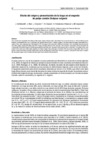Identificador persistente para citar o vincular este elemento:
https://accedacris.ulpgc.es/jspui/handle/10553/77421
| Campo DC | Valor | idioma |
|---|---|---|
| dc.contributor.author | Estefanell, J. | en_US |
| dc.contributor.author | Roo, J. | en_US |
| dc.contributor.author | Socorro, J. | en_US |
| dc.contributor.author | Guirao, R. | en_US |
| dc.contributor.author | Fernández Palacios, H. | en_US |
| dc.contributor.author | Izquierdo, M. S. | en_US |
| dc.date.accessioned | 2021-02-01T11:59:13Z | - |
| dc.date.available | 2021-02-01T11:59:13Z | - |
| dc.date.issued | 2009 | en_US |
| dc.identifier.isbn | 978-84-937611-0-3 | en_US |
| dc.identifier.uri | https://accedacris.ulpgc.es/handle/10553/77421 | - |
| dc.description.abstract | The present work evaluates the effect of the bogue (Boops boops) origin «discarded» from local fish farms or wild provided by local fisheries, presented fresh or as a moist diet, over growth and survival in Octopus vulgaris. Five diets based on bogue were tested for 4 weeks in four male octopuses kept individually in PVC net cages in the same tank. Different parameters were calculated: absolute growth rate (AGR, g/day), standard feeding rate (SFR, %/day) and feed efficiency (FE). Besides, macronutrient composition of the assayed diets is presented. Discarded bogue moist diet generated the best AGR ever recorded in this species with a moist diet, 13.9 g/day, which was similar to the fresh and control diets supplied, all of them higher than wild bogue moist diet. SFR was similar among diets while FE was higher in both moist diets probably related with a higher disintegration of this type of food. In general, best growth observed in octopus fed discarded bogue may be related with the higher lipid content of this food item. | en_US |
| dc.language | spa | en_US |
| dc.publisher | Universidad Politécnica de Madrid | en_US |
| dc.source | XII Congreso Nacional de Acuicultura, Madrid 24-26, Noviembre 2009 [ISBN 978-84-937611-0-3], Sección de Nutrición, Comunicación oral, p. 42-43 | en_US |
| dc.subject | 310502 Piscicultura | en_US |
| dc.subject.other | Octopus vulgaris | en_US |
| dc.subject.other | Boops boops | en_US |
| dc.title | Efecto del origen y presentación de la boga en el engorde de pulpo común Octopus vulgaris | en_US |
| dc.type | info:eu-repo/semantics/conferenceobject | en_US |
| dc.type | ConferenceObject | en_US |
| dc.relation.conference | XII Congreso Nacional de Acuicultura | en_US |
| dc.description.lastpage | 43 | en_US |
| dc.description.firstpage | 42 | en_US |
| dc.investigacion | Ciencias | en_US |
| dc.type2 | Actas de congresos | en_US |
| dc.description.numberofpages | 2 | en_US |
| dc.identifier.ulpgc | Sí | en_US |
| dc.contributor.buulpgc | BU-BAS | en_US |
| item.fulltext | Con texto completo | - |
| item.grantfulltext | open | - |
| crisitem.author.dept | GIR Grupo de Investigación en Acuicultura | - |
| crisitem.author.dept | IU de Investigación en Acuicultura Sostenible y Ecosistemas Marinos (IU-Ecoaqua) | - |
| crisitem.author.dept | Departamento de Biología | - |
| crisitem.author.dept | GIR Grupo de Investigación en Acuicultura | - |
| crisitem.author.dept | IU de Investigación en Acuicultura Sostenible y Ecosistemas Marinos (IU-Ecoaqua) | - |
| crisitem.author.dept | Departamento de Biología | - |
| crisitem.author.orcid | 0000-0002-9660-230X | - |
| crisitem.author.orcid | 0000-0003-4297-210X | - |
| crisitem.author.parentorg | IU de Investigación en Acuicultura Sostenible y Ecosistemas Marinos (IU-Ecoaqua) | - |
| crisitem.author.parentorg | IU de Investigación en Acuicultura Sostenible y Ecosistemas Marinos (IU-Ecoaqua) | - |
| crisitem.author.fullName | Roo Filgueira, Francisco Javier | - |
| crisitem.author.fullName | Izquierdo López, María Soledad | - |
| Colección: | Actas de congresos | |
Visitas
85
actualizado el 11-ene-2026
Descargas
27
actualizado el 11-ene-2026
Google ScholarTM
Verifica
Altmetric
Comparte
Exporta metadatos
Los elementos en ULPGC accedaCRIS están protegidos por derechos de autor con todos los derechos reservados, a menos que se indique lo contrario.
